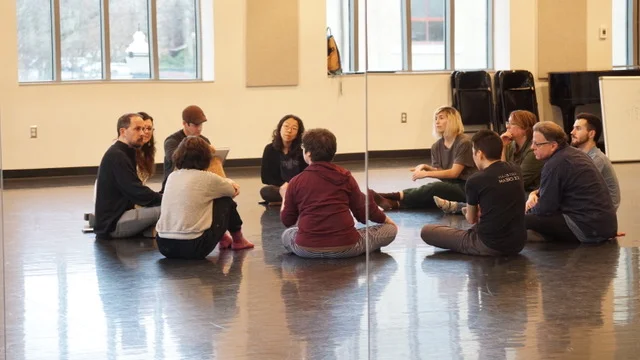Collaborating faculty member Matthew Lewis writes: I arrived at the humane technologies project and group later than most of the participants. I was invited to participate in the pop-up week which would focus on virtual reality this semester. I've been curious about using VR technologies for interface prototyping, and this seemed like a great opportunity. As with all pop-up participants, I was encouraged to consider either joining existing project groups, or to bring my own ideas to the table.
Not having been part of the earlier discussions, my unbiased ideas about "humane technologies" primarily involved evaluating people's interactions with the technology emerging around them in positive and negative ways. In particular, I've been reading almost daily newspaper articles about the "internet of things" (IoT). Usually these discussions center on debates between convenience vs privacy: e.g. your internet connected devices are controllable via your smartphone, but they also report your engagement to advertisers for marketing purposes.
Discussions of the Internet of Things tend to predict that smart objects will be increasingly communicating in complex webs of systems which may or may not have our best interests in mind. In the same vein as it is often said that, "you are not the consumer but rather the product" for companies like Facebook, networked smart objects like your TV might be "free" to use as well, in exchange for you allowing an infrared camera to monitor your apartment and track your eyes as you watch TV.
With this content in mind at my first humane tech meeting, I heard Professor Michelle Wibbelsman (Spanish & Portuguese) mention two things that resonated for me: indigenous peoples' beliefs about objects having agency, and also "Object Oriented Ontologies" (OOO). I was curious about the idea that some cultures may have already thought a great deal about how to live surrounded with objects that have agency. Additionally, "Object Oriented Ontology" is a relatively recent perspective on metaphysics that’s attracted some attention from computer scientists working at the intersection of philosophy and human computer interaction. OOO involves a de-centering of humans that considers physical objects, ideas, their relationships, and agencies all as equally valid objects of philosophical consideration.
At this same initial meeting, Professor Hannah Kosstrin (Dance) mentioned that her motion analysis class's graduate students would be available to participate in projects during the pop-up week. Years ago I was fascinated by a presentation I’d seen on "service prototyping" which used actors as participants for interactive system design. I proposed that Hannah's students could embody the roles of communicating IoT devices, exploring the possibility space of system agency. Many IoT species will converse primarily with other smart objects and networked systems, rather than interacting directly with people in their space. What might such devices be "talking" about? What could their awareness and motivations encompass in different future scenarios?
Additionally, I envisioned another participant immersed in a VR apartment environment, experiencing representations of these devices communicating around them. For example, there might be an indication that a smart TV, smart refrigerator, and smart couch were all observing aspects of their environment, and "doing their job" whatever that might be. What would this be like to live in such a space?
I suspected that by embodying this simulation/performance, it might lead to thought provoking discussion, helping us to contemplate aspects of such emerging technologies and trends in ways we might not have otherwise considered from mere thought experiments. I also hoped we might gain insight into the humane technology aspects of IoT, beyond the current discussions of privacy vs. convenience. Last, I hoped to gain experience with the usefulness of VR for interaction design prototyping. In a followup post, I'll discuss the implementation and outcomes of the pop-up.


